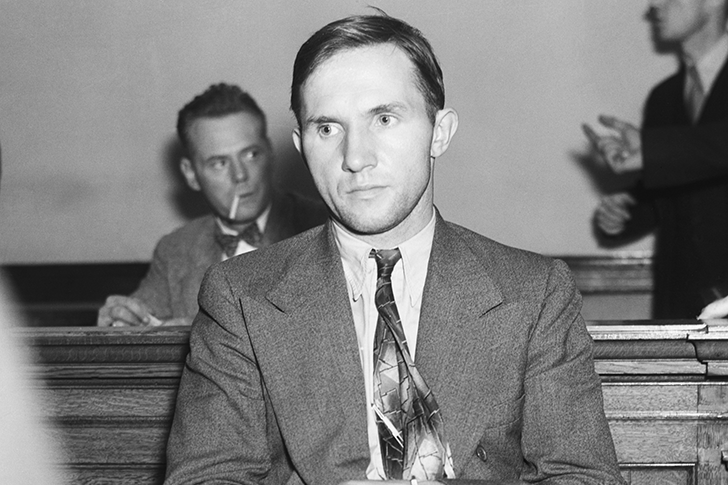I used to work for Ludo, as we all knew him on BBC2’s Did You See?, and was once thought to be his illegitimate son. In 1963, on a visit to Phnom Penh, he danced with my mother in a nightclub under the stars, but I was already six years old and, according to her, nothing happened, except that he made her laugh. ‘That’s always dangerous.’
A pioneer of the interviewing art, without whom there would have been no Jeremy Paxman, Ludo once told me: ‘There are two types of people who work for the BBC. Those who use it, and those who are used by it. Make sure you’re the former.’ Ludo made sure, even to the extent of bringing his dry cleaning to the office.
In the judgment of his fellow Liberal, Mark Bonham Carter, Sir Ludovic Kennedy (as he became) was someone who made the absolute utmost of his talents. An Old Etonian and Oxonian who took elocution lessons so that he would sound classless, he embodied a generation of educated presenters like Robin Day and Robert Kee who had experience of the world and were unafraid to pose any question to anybody. Courteous, intelligent, frank and funny, Ludo held his television career in proper perspective, frequently maintaining that ‘TV had little or no impact’ and only on rare occasions could do a subject justice. He was prouder by far of his writing career. He was a terrific journalist and book reviewer, and if his one regret, which he reiterated at our last meeting shortly before his death in 2009, was that he never wrote the great novel of his ambition, then it consoled him that neither did anyone else.
What Richard Ingrams calls Ludo’s ‘storyteller’s instinct’ instead found an outlet in a series of remarkable non-nichfiction narratives about innocent men who had been wrongly convicted, incarcerated, and in some instances executed, for crimes they had not committed.
As Ingrams explains it, ‘The need for a scapegoat remains a powerful human instinct in the wake of any terrible crime.’ As a child, Ludo had absorbed at first hand a depressing truth later articulated by the human rights lawyer Gareth Peirce: ‘It is not difficult to secure the conviction of the innocent.’ Ludo’s much-adored father had been unfairly court-martialled and drummed out of the Navy for failing to deal with a mutiny; and while it is impossible to say whether this was a motivation, even unconsciously, for Ludo’s subsequent championing of the unjustly accused, there is no disputing the acuity of his eye for a scapegoat.
In the Did You See? office, Ludo’s excitement was infectious when he spoke of the genesis for his best and longest book, The Airman and the Carpenter (1985), about the kidnap and murder of Charles Lindbergh’s baby son in 1932. Ludo had been in New York for the programme when he turned on his hotel television and saw an elderly lady declaring with fierce passion that her husband was innocent of the crime for which he had been executed 45 years earlier. ‘Such intensity of feeling was beyond contrivance.’ Ludo sat back and listened. The woman was Anna Hauptmann, the widow of the German carpenter whose ‘haggard, anguished face’ filling the front page of every British newspaper on the day after his arrest ‘had been one of my earliest and most vivid childhood memories’.
Not in an unlike manner had Ludo earlier picked up cudgels on behalf of Timothy Evans, falsely accused of murdering his wife and daughter at 10 Rillington Place, after seeing Evans’s haunted, startled features in a photograph, dwarfed by two burly policemen.
Ingrams first met Ludovic Kennedy also in 1963, and in this short appreciation — which uses his published work as the clothes-line on which to peg a somewhat sanitised version of his life — Ingrams argues that Ludo had a more influential role in dismantling the old Establishment than has previously been recognised. ‘As a result of his writing, Ludo became the inspiration for a small band of journalists who devoted themselves to exposing miscarriages of justice’ — including Paul Foot, Patrick Marnham, Chris Mullin and David Jessell. Kennedy’s exposés, like 10 Rillington Place (1961) and The Trial of Stephen Ward (1964), ‘played a major part’ in the eventual abolition of capital punishment in Britain in 1965. Not only that, but several important reforms ‘owed a great deal to his campaigns’ — most notably the Police and Criminal Evidence Act of 1984, which made it a statutory obligation to tape-record the questioning of every suspect. Such was the cumulative power of Ludo’s books, is Ingrams’s persuasive thesis.
‘Be a road-sweeper,’ advised Evelyn Waugh, when Ludo asked him how to earn a living while writing. And in a sense he did become one. He might not have achieved a reputation as a novelist, but in redirecting his natural storytelling gifts into ‘what he was best at’, Ludo cleaned up the excruciating legal and human messes left behind by corrupt policemen like the Flying Squad’s Commander Kenneth Drury (who connived with a hardened criminal to imprison three men he knew to be innocent) and buffoonish judges like Lord Goddard (who Ludo suggested ‘was in the habit of masturbating when pronouncing the death sentence’) or Lord Robertson (‘as arrogant as he was ignorant’) or Lord Hunter (‘almost as big a dumbo as Lord Robertson’).
Yet Ludo did more than sweep; he also paved. In fighting for almost 50 years to keep the road to justice accessible and secure, it is not too much to say that he laid foundations which continue to benefit us all.






Comments